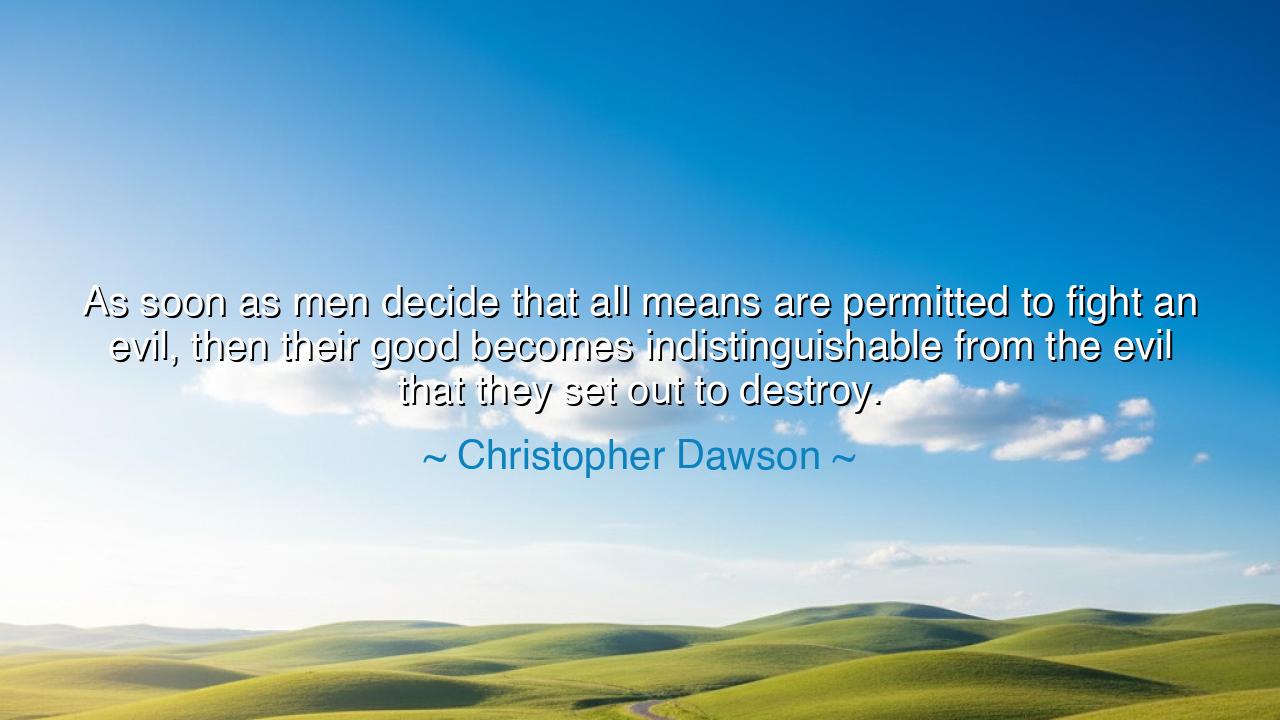
As soon as men decide that all means are permitted to fight an
As soon as men decide that all means are permitted to fight an evil, then their good becomes indistinguishable from the evil that they set out to destroy.






"As soon as men decide that all means are permitted to fight an evil, then their good becomes indistinguishable from the evil that they set out to destroy." These profound words, spoken by the historian and philosopher Christopher Dawson, hold a lesson as old as humanity itself, a timeless warning about the corruption of the soul when it embraces the methods of those it seeks to overcome. This truth transcends the realms of mere history or philosophy; it speaks directly to the core of moral integrity and the dangers that arise when men and women, in their righteous zeal to eradicate evil, lose sight of the very principles that made their cause noble in the first place.
The words remind us that good is not simply a matter of the end, but of the means by which we achieve it. When one decides that all paths are justified in the pursuit of justice or righteousness, they risk sacrificing the very virtue that defines their cause. Evil, as Dawson warns, is not only what is perpetrated by the enemy; it is also the corruption of the good by the actions we take to fight it. The moment we abandon our moral compass in the name of victory, we blur the lines between what is just and what is tyrannical. The fight against evil should never be fought with the weapons of evil, for in doing so, we surrender our soul to the very darkness we seek to overcome.
Consider, if you will, the story of Nazi Germany and the Allied forces during the Second World War. The Allies fought against an unprecedented evil, seeking to rid the world of the oppressive regime that had plunged it into chaos and suffering. Yet, in their desperation to destroy the Nazis, many of the actions taken by the Allies were ruthless and brutal. The bombings of Dresden and Hiroshima, though justified as necessary to bring the war to an end, left in their wake devastation and innocent lives lost. In this, we see Dawson’s truth—though the Allies sought to defeat a terrible evil, the methods they employed in their pursuit sometimes mirrored the very destruction they sought to end. The question remains: did these actions make them any less guilty of the evil they fought?
Even the greatest of heroes can be undone when they lose sight of their integrity in the heat of battle. Mahatma Gandhi, a man whose life was dedicated to the peaceful resistance of British rule in India, understood this principle better than most. He recognized that one could not fight oppression with violence and expect to preserve the dignity of the cause. For him, the true strength lay not in the destruction of the oppressor but in the purity of the methods used to resist. Gandhi’s resistance was a rejection of violence, not only because it was unjust but because it would contaminate the very fabric of the struggle for freedom. His teachings are a testament to the belief that a good cause, pursued by evil means, will lose its righteousness.
Dawson’s warning applies not only to great historical events but to our everyday lives. In our own quests for justice, how often do we find ourselves tempted to abandon our principles in the face of opposition? How often do we justify the use of harsh words, deceit, or intolerance in the name of fighting for what we believe is right? Whether in the realm of politics, personal relationships, or societal causes, the lesson remains the same: the means by which we pursue a goal are just as important, if not more so, than the goal itself. Integrity and honor are not mere ideals to be set aside when convenient; they are the very foundation of the good we seek to build.
Thus, the lesson is clear: let us guard against the temptation to sacrifice our virtue for the sake of victory. Let us remember that in our fight against evil, it is not only the end we seek but the path we tread to get there. In this path, we must walk with the light of moral clarity and steadfastness, lest we become the very thing we despise. In every struggle, in every battle, in every fight against injustice, the true victory lies not in the overthrow of the oppressor but in the preservation of our own integrity and the purity of our methods.
So, take heed, and reflect upon your own actions. When faced with a great injustice, a deep wrong in your life or the world, ask yourself: am I willing to compromise my integrity to see this evil defeated? For it is not only the enemy’s destruction that matters, but your own soul’s purity in the process. The fight against evil is a fight for goodness, and that goodness must remain untarnished by the very tools we use to battle it. Choose your methods wisely, for the means will shape the end, and in the end, it is the purity of your path that will determine the true victory.






AAdministratorAdministrator
Welcome, honored guests. Please leave a comment, we will respond soon